Recognizing signs of emotional abuse is a crucial step in identifying unhealthy relationships and taking control of your well-being. It’s not always easy to spot, as emotional abuse often happens behind closed doors, leaving scars that are hard to see.
But these questions about emotional abuse can help you understand if you are a victim of emotional abuse.
We’ve put together a list of hard-hitting questions about abuse that can help you navigate the intricate web of emotional abuse. These questions about abuse are designed to make you pause, reflect, and honestly assess your situation.
Now, fair warning, some of these questions might hit close to home, but it’s essential to face the truth head-on.
Before we talk about the questions for emotional abuse, let us first understand what is emotional abuse and the signs of emotional abuse.
Related: Abuse Doesn’t Always Leave Bruises And Broken Bones: Why The Inner Damage Is Worse
What Is Emotional Abuse?
Emotional abuse is like a stealthy ninja that attacks your self-worth and mental well-being. It’s a form of mistreatment that doesn’t leave physical bruises but leaves scars deep within your soul. Think of it as a toxic cocktail of manipulation, control, and belittlement.
Picture this: you’re in a relationship or situation where someone constantly puts you down, criticizes your every move, and dismisses your feelings.
They isolate you from friends and family, making you feel like you’re walking on eggshells all the time. They use guilt, manipulation, or even threats to bend you to their will.
Emotional abuse can come in various disguises. It’s that partner who undermines your achievements, the friend who constantly makes you doubt your decisions or even a family member who controls every aspect of your life.
The common thread is that it chips away at your self-esteem, leaving you feeling small, worthless, and trapped.
Now that we know what is emotional abuse, let’s find out the signs of emotional abuse.
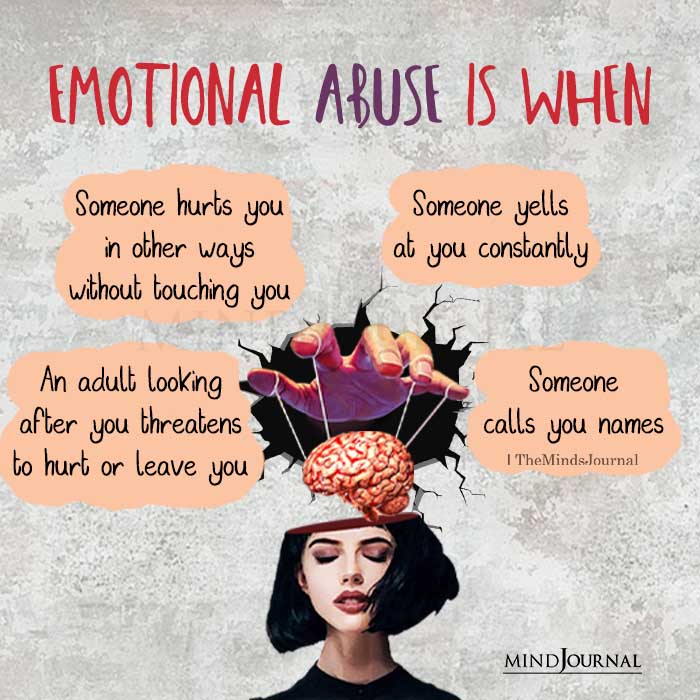
What Are The Signs Of Emotional Abuse?
Look out for these signs of emotional abuse, so that you know exactly what are being made to go through.
- Constant criticism and belittling.
- Manipulation and control over your actions and decisions.
- Isolation from friends, family, and support systems.
- Gaslighting, which makes you doubt your own reality and sanity.
- Intense jealousy and possessiveness.
- Verbal insults, name-calling, or derogatory language.
- Undermining your self-esteem and making you feel worthless.
- Threats, intimidation, or violence to maintain control.
- Blaming you for their abusive behavior or shifting responsibility.
- Ignoring or dismissing your feelings and emotional needs.
- Excessive monitoring or surveillance of your activities, both online and offline.
- Using your vulnerabilities or insecurities against you as a means of control.
- Withholding affection, love, or emotional support as a form of punishment.
- Intentionally damaging or destroying your personal belongings or property.
- Threatening to harm you, others, and even themselves, just to control and manipulate you.
Now, let’s find out about the questions for abuse or questions about emotional abuse.
60+ Hard-Hitting Questions About Emotional Abuse
1. Does your partner frequently belittle or demean you?
2. Do they consistently criticize your appearance, intelligence, or abilities?
3. Are they overly controlling, demanding, or possessive?
4. Are they excessively possessive of your body, constantly demanding access to it?
5. Have they threatened to harm themselves if you leave the relationship?
6. Are they overly critical of your choices in clothing, hairstyle, or personal appearance?
7. Have they threatened to harm or kill your pets or other loved ones?
8. Have they made you doubt your own sanity or reality through extensive gaslighting?
9. Have they monitored your phone calls, texts, or emails without your consent?
10. Are they emotionally volatile, with frequent mood swings or outbursts?
Related: 8 Kinds Of Psychologically Violent People
11. Do they minimize or deny the impact of their behavior on your well-being?
12. Does your partner put on a friendlier and respectful persona when they’re in public while acting differently and treating you with less kindness behind closed doors?
13. Do they frequently use insults, name-calling, or derogatory language towards you?
14. Are they excessively possessive or jealous of your friendships or other relationships?
15. Are they dismissive of your emotions or emotional needs?
16. Do they control your finances or restrict your access to money?
17. Do you often find yourself treading cautiously around them, constantly mindful of your words and actions to avoid unintentionally upsetting or offending them?
18. Does your partner have a habit of offering comfort and playing the hero after causing you pain?
19. Do they frequently invalidate your feelings or experiences?
20. Do they humiliate or embarrass you in front of others?
21. Do they use sarcasm or put-downs as a regular form of communication?
22. Are they excessively critical of your choices or decision-making abilities?
23. Do they make you feel responsible for their emotions or problems?
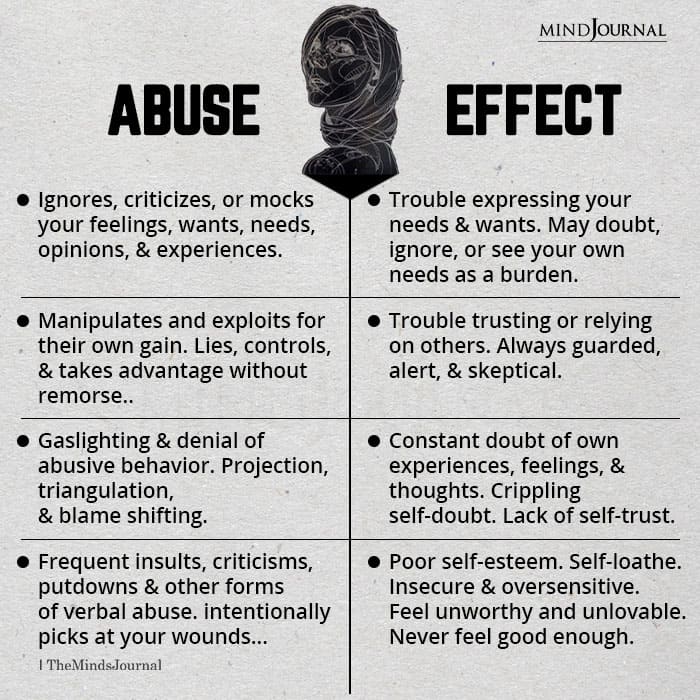
24. Are they quick to anger or easily provoked by minor issues?
25. Have they monitored or stalked your activities, both online and offline?
26. Have they threatened to reveal sensitive information or private experiences about you?
27. Does your partner have a knack for switching between being sweet and affectionate one moment, only to suddenly turn cold and withdraw their warmth?
28. Is the way your partner treated you at the start of the relationship completely different from how they treat you now, to the point where it’s almost unrecognizable?
29. Have they coerced or pressured you into engaging in activities you are uncomfortable with?
30. Are they overly critical of your parenting decisions or interactions with your children?
31. Have they threatened or attempted to harm themselves as a means to manipulate you?
32. Have they forced you to engage in financial transactions against your will?
Related: 10 Questions To Ask Yourself Before You Forgive Your Cheating Partner
33. Are they dismissive of your concerns or emotions, making you feel insignificant?
34. Do they intentionally trigger your past traumas or vulnerabilities to manipulate you?
35. Have they forced you to engage in self-harming behaviors or activities?
36. Are they emotionally absent or unresponsive when you express your needs or emotions?
37. Have they made you feel responsible for their substance abuse or addiction issues?
38. Are they overly possessive or jealous of your achievements or successes?
39. Do they consistently ignore or dismiss your boundaries, pushing you to do things you’re uncomfortable with?
40. Do they manipulate your emotions by giving you mixed signals or playing mind games?
41. Are they emotionally cold or distant, withholding affection or love as a form of punishment?
42. Do they use threats or coercion to force you into staying in the relationship?
43. Does your partner always brush off your emotions and accuse you of being overly sensitive whenever you try to express how you feel?
44. How often do you find yourself feeling insecure, ignored, and overlooked when your partner talks to someone of the opposite sex?
45. How many times has your partner hypocritically pointed out your flaws, even though they have the same flaws themselves?
46. Have they threatened to ruin your reputation or spread false rumors about you?
47. Are they excessively critical of your cultural background, race, or ethnicity?
Related: 12 Signs You Are Being Emotionally Abused
48. Do you feel like your partner is always quick to criticize and give you negative feedback about yourself, while rarely offering words of encouragement?
49. How many times has your partner insulted you and made you feel awful, only to brush it off with the excuse of “just joking”?
50. Have they isolated you from friends, family, or other support systems?
51. Are they excessively jealous or accuse you of being unfaithful without reason?
52. Are they excessively possessive of your time and attention?
53. Have they coerced or manipulated you into signing legal or financial documents?
54. Do they use threats or intimidation to prevent you from seeking help or support?
55. Do they frequently change the rules or expectations without prior notice?
56. Have they prevented you from seeking medical attention or care when needed?
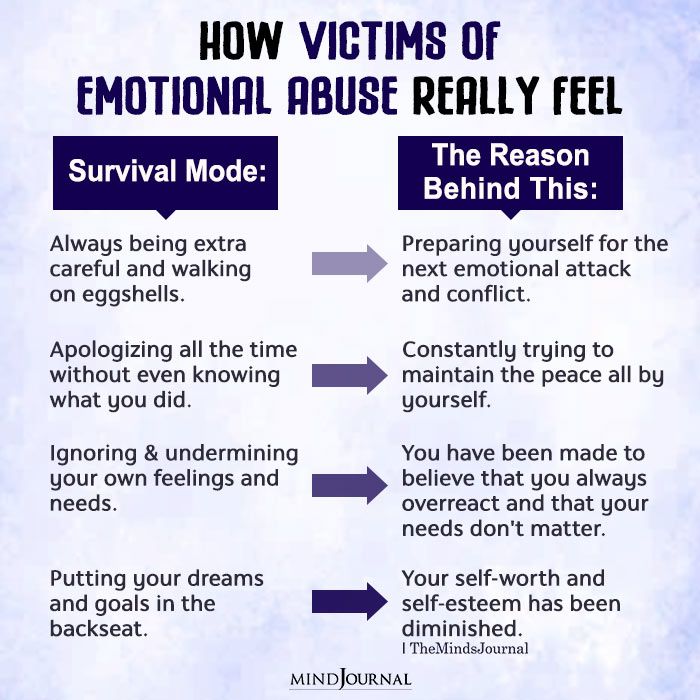
57. Do you often feel hopeless, helpless, and emotionally numb?
58. Are you always made to wonder whether you are the “crazy one” in the relationship?
59. Have they coerced or manipulated you into engaging in illegal activities?
60. Do they use physical force, such as grabbing, pushing, or slapping, to intimidate you?
61. Have they ever forced you to engage in sexual activities that you find degrading or painful?
62. Do they use your past mistakes or vulnerabilities against you as a form of control?
63. Do they regularly insult your intelligence or make you feel stupid?
64. Are they dismissive or derogatory towards your religious or spiritual beliefs?
65. Have they blamed you for their own anger or emotional outbursts?
Takeaway
If you find yourself answering “yes” to many of these questions about emotional abuse, it may indicate that you are experiencing emotional abuse in your relationship.
Understanding what is emotional abuse and the signs of emotional abuse can help you protect yourself from an abuser’s torment.
Related: What Is Emotional Abuse? 10 Signs You’re Being Emotionally Abused
Remember, emotional abuse is never acceptable, and seeking support from trusted friends, family, or professionals can help you navigate this difficult situation and find a path to healing and safety.
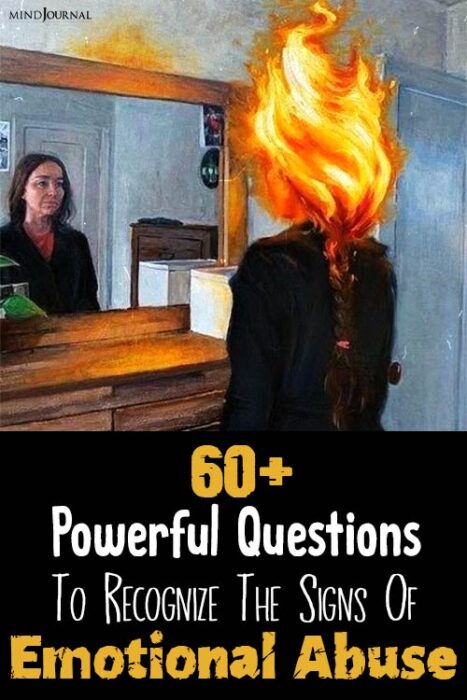
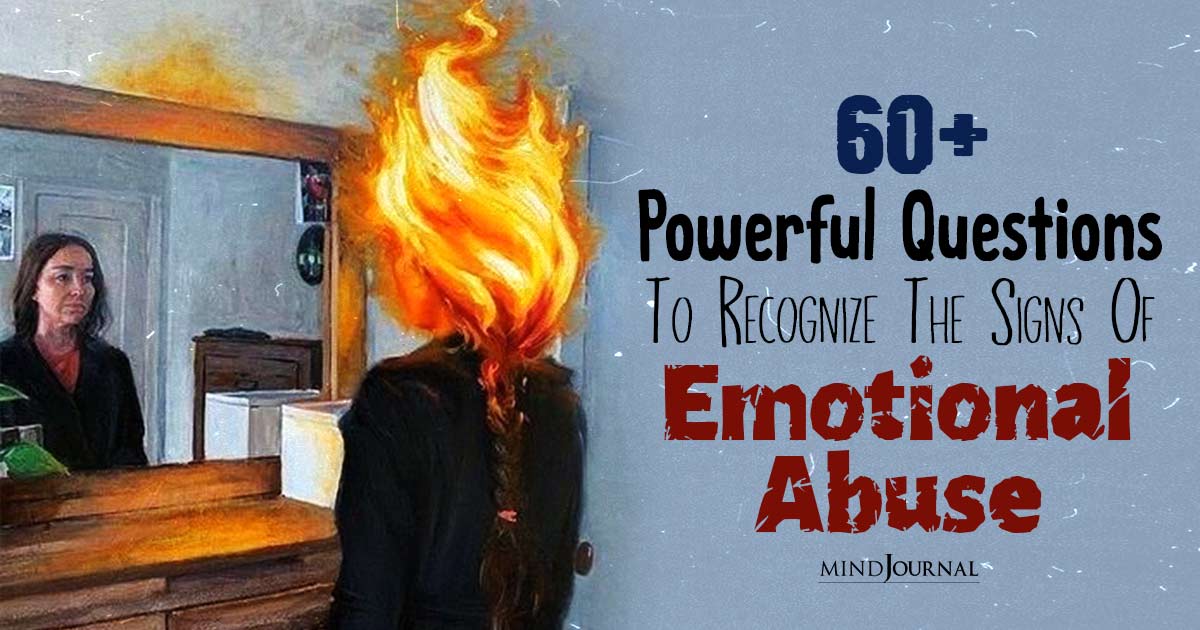







Leave a Reply
You must be logged in to post a comment.